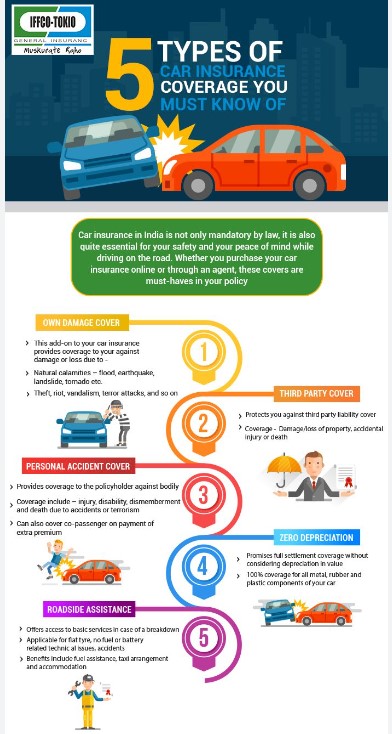Car insurance is essential for anyone who owns a vehicle, and it is required by law in many states. There are several types of car insurance coverage available, including liability, collision, and comprehensive insurance. In this article, we will discuss each of these insurance types in detail to help you determine which one is right for you.
1. Introduction
Car insurance is designed to protect you financially in case of an accident or damage to your car. There are several types of car insurance coverage available, and it is important to understand each type so that you can choose the right coverage for your needs.
2. Liability Insurance
Liability insurance is the most basic type of car insurance and is required by law in most states. It covers the cost of damage or injury that you may cause to another person or their property while driving your car. Liability insurance typically includes two types of coverage: bodily injury liability and property damage liability.
Bodily injury liability coverage pays for medical expenses, lost wages, and other damages resulting from injuries sustained by another person in an accident that you caused. Property damage liability coverage pays for repairs or replacement of property damaged in an accident that you caused.
3. Collision Insurance
Collision insurance covers the cost of repairs to your car if it is damaged in an accident, regardless of who is at fault. This type of insurance is optional but may be required if you have a car loan or lease.
4. Comprehensive Insurance
Comprehensive insurance covers the cost of repairs to your car for damage that is not caused by an accident. This includes damage from weather events, theft, vandalism, and other non-collision incidents. Like collision insurance, comprehensive insurance is optional but may be required if you have a car loan or lease.
5. Differences between Collision and Comprehensive Insurance
Collision and comprehensive insurance are often confused, but they cover different types of damage. Collision insurance covers damage that occurs in an accident, while comprehensive insurance covers damage that occurs outside of an accident, such as theft or vandalism.
6. Factors that Affect Insurance Rates
Several factors can affect your car insurance rates, including your driving record, age, gender, location, and the type of car you drive. Insurance companies also consider the level of coverage you choose, the deductible amount, and any discounts that may apply.
7. How to Choose the Right Insurance Coverage
When choosing car insurance coverage, it is important to consider your budget and your individual needs. If you have a car loan or lease, collision and comprehensive insurance may be required. If you have an older car or a car with a low value, liability insurance may be sufficient.
8. Common Car Insurance Myths
There are many myths about car insurance that can be confusing. Some of the most common myths include the idea that red cars cost more to insure and that your credit score does not affect your insurance rates. It is important to understand the truth behind these myths to make informed decisions about your insurance coverage.
9. Tips for Saving Money on Car Insurance
Car insurance can be expensive, but there are several ways to save money on your premiums. These include shopping around for the best rates, raising your deductible, maintaining a good driving record, and taking advantage of discounts offered by insurance companies.
10. Conclusion
In conclusion, car insurance is essential for protecting yourself and others on the road. There are several types of car insurance coverage available, including liability, collision, and comprehensive insurance. It is important to understand the differences between these types of coverage so that you can choose the right coverage for your needs and budget.
11. FAQs
- What is liability insurance? Liability insurance is the most basic type of car insurance and covers the cost of damage or injury that you may cause to another person or their property while driving your car.
- What is collision insurance? Collision insurance covers the cost of repairs to your car if it is damaged in an accident, regardless of who is at fault.
- What is comprehensive insurance? Comprehensive insurance covers the cost of repairs to your car for damage that is not caused by an accident, such as weather events, theft, vandalism, and other non-collision incidents.
- Do I need collision or comprehensive insurance? Collision and comprehensive insurance are optional but may be required if you have a car loan or lease. If you have an older car or a car with a low value, liability insurance may be sufficient.
- How can I save money on car insurance? You can save money on car insurance by shopping around for the best rates, raising your deductible, maintaining a good driving record, and taking advantage of discounts offered by insurance companies.
Read More :
- How to Save Money on Car Insurance Premiums : Tips and Tricks
- How Much Life Insurance Do You Really Need? A Guide to Calculating Coverage
- The Best Car Insurance Companies : Ratings, Reviews, and Rankings
- Term Life vs Whole Life Insurance : Which is Right for You
- Car Insurance 101: Understanding the Basics and Benefits
